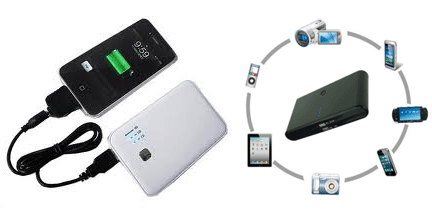Ibrahim Jilani, Program Manager
UL LLC
As of May 1st, 2014, Taiwan’s Bureau of Standards, Metrology & Inspection (BSMI) has mandated that rechargeable lithium-ion (Li-ion) battery packs used in Computer, Communication, & Consumer Electronics be certified to CNS 15364 (similar to IEC 62133). This also includes the product type known as “Power Bank” or the portable back-up battery power, which also requires safety requirements from CNS 14336-1 (IEC 60950-1) and EMI requirements from CNS 13438 (CISPR 22) be considered. This is one of the first instances of requiring safety requirements for this type of battery product, and yet it seems that required safety certification of Power Banks should have always exists.
Power Banks can be in the form factor of a cell phone case that becomes an integral part of the cell phone. However, they are most often stand-alone devices connecting to the products they will charge via USB cable. Pictures of such devices are below.

Typically, the driving force for Li-ion battery components and products to meet appropriate safety requirements is because it is specified in the end-product standard the battery will be used in. For instance, today in the North American Market, a Li-ion battery pack used in a notebook computer is required to be evaluated to UL 2054 as detailed in the end-product standard for notebooks UL/CSA 60950-1. Also for a cell phone battery sold in the U.S., the requirements come from IEEE1725 as specified by CTIA – The Wireless Association which is overseen by US wireless carriers.
Portable power banks are often considered an end product rather than a component (they are not often built as a component inside another product like a laptop or cell phone). Similar to other mobile type devices, there has not been a definitive direction towards safety certification in the majority of the world. This is very alarming considering the dangers that can be present when using a rechargeable lithium product. The lithium cell’s ability to comply to safety requirements including abuse conditions, the protection circuit employed in the power bank, the dc-to-dc convertor circuit (5 V DC USB Port to 3.7 VDC of the lithium cell), and the component ratings including the plastic housing all remain unchecked. There also has been no testing done to verify the cell and battery pack within the power bank are capable of handling normal operation or foreseeable abnormal operation (such as overcharging the Power Bank or an external short circuit).
There have been reported instances to the US Consumer Product Safety Commission (CPSC) of fires that resulted from using a power bank. In recent months, UL has also received comments from both consumers and businesses about various kinds of power banks. There have been even cases where the power bank erupted in fire without it even being opened from the packaging it was shipped in. It’s possible that hazards from power banks may have been avoided if the product designs had been compliance tested which could help to discover any safety design issues prior to the product being sold in the marketplace.
The regulation that Taiwan (BSMI) adopted this year is a positive step towards assisting manufacturers in identifying applicable safety requirements for their products. The dangers from Li-ion powered devices are real and the rest of the world should look to adopt a similar approach to require safety certification that Taiwan has now implemented.
For the North American market, since most portable power banks are used to charge cell phones, tablets, other information and communication technology, or consumer electronic equipment, the recommendation is to have the portable power banks evaluated and certified to UL/CSA 60950-1 and UL 2054. UL strongly urges those who are purchasing Power Bank products to look for the UL Mark. The UL Mark indicates the product was evaluated to the applicable safety standards. A Power Bank with the UL Mark also means the lithium cell(s) employed in the product meet UL 1642, the Standard for Lithium Battery Cells. This standard ensures the lithium cell has been subjected to abuse/abnormal conditions as part of its testing.
For portable power bank manufacturers who are looking to have their products certified and differentiated in the marketplace, they can contact UL at batteries@ul.com and a team of UL global battery engineers will assist you with your testing and certification needs.
Click Here for a Message from UL – Stay In-Charge. Stay Charged.







